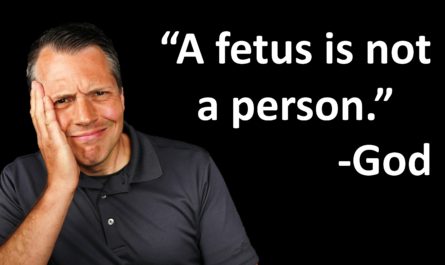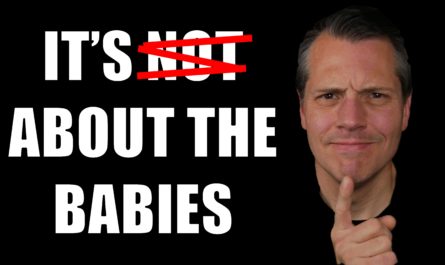What does it mean to be “pro-life” and “pro-choice?”
[You can watch my video on this below if you prefer.]
With the recent Supreme Court ruling on abortion, the division between Americans on this topic has increased exponentially. No one can be ambivalent on the subject. Every American is either pro-choice or pro-life. But what do these terms mean?
Ultimately, the difference is a matter of principle. Pro-lifers have a principle that informs their view, and pro-choicers have a principle that informs their view. When we understand the principles, we can understand the group.
What does it mean to be pro-life?
The practical result of being pro-life is that we think a baby should be allowed to be born. Pro-lifers operate with this principle: Life is precious and should only be taken in exchange for another life.
There are two points, however, where pro-life folks may disagree. These are whether abortion should be allowed when the life of the mother is in danger or in cases of rape and incest.
Let’s consider each of these.
First, should abortion be allowed when the life of the mother is in danger? I think very few pro-life people would argue that a baby must be allowed to live if the pregnancy will likely result in the death of the mother. This falls under the same category as self-defense, which many pro-lifers would support. A similar situation would be if the separation of conjoined twins would likely result in the death of one, but neglecting the operation would result in the death of both. In both cases, a life is taken for a life to survive. The underlying pro-life principle informs both positions. The only time we should take a life is in exchange for another life.
But what about cases of rape and incest? While this argument is often proposed by pro-choice people it is extremely rare and just thrown into the mix for the sake of argument. But, because it is in the mix, we have to deal with it.
Before we do so, however, let’s clarify the question. I see no need to separate rape and incest. If the incest is rape, let’s call it rape. If it is consensual, it falls under consensual sex. So, should we allow abortion in the case of rape?
To answer this question, we have return to our pro-life principle: life is precious, and should only be taken in exchange for another life. While a woman who has experienced rape has experienced a very difficult situation, the principle does not allow for the taking of the life. If the father is known, he should be solely responsible for providing financially for the baby. But whether or not he is known, the sin of the father is not just cause to take the life of the baby.
Of course, this is not fair for the woman, but we are trying to be guided by principle. The actions of others often inconvenience us, but do not make it right to do something wrong.
Now, let’s move to what it means to be pro-choice.
What does it mean to be pro-choice?
In fairness, let’s let pro-choice people define this for us. According to the Planned Parenthood website:
“Generally, people who identify as pro-choice believe that everyone has the basic human right to decide when and whether to have children.”[i]
So, it’s up to you to decide when to have children. At first, this may seem fine. Of course we should be able to choose when to have children! But when we drill down into this a little more, we find some problems.
“When you say you’re pro-choice you’re telling people that you believe it’s OK for them to have the ability to choose abortion as an option for an unplanned pregnancy — even if you wouldn’t choose abortion for yourself.”[ii]
This is nothing more than a blatant attempt at confusion. Just because I am not willing to drive you everywhere you want to go doesn’t mean I shouldn’t tell you not to drive drunk. And just because I’m not offering to take your child into my home doesn’t mean I should condone you killing it.
So, we’ve moved from planning when to have children to killing a child who is “unplanned.” We’ve already discussed the “unplanned” children who are conceived by rape, which are very few. The pro-choice claim is that any unborn child that is not wanted can be killed. That means that two people who engage in consensual sex, knowing that it can produce a baby, can kill the child if one is conceived.
Basically, the difference is one of principle. Remember the pro-life principle: Life is precious and should only be taken in exchange for another life.
Here is the pro-choice principle: We should not be forced to experience the inconvenience of an unwanted child.
So, you can see that the focus has shifted from the right of the child to experience life to our own quality of life. Of course, there is a deeper question about if the embryo is life. The answer is “yes,” but that is the subject for another time.
Let’s continue a little further in this article on Planned Parenthood’s website.
“People who oppose abortion often call themselves pro-life. However, the only life many of them are concerned with is the life of the fertilized egg, embryo, or fetus. They are much less concerned about the life of women who have unintended pregnancies or the welfare of children after they’re born. In fact, many people who call themselves “pro-life” support capital punishment (AKA the death penalty) and oppose child welfare legislation.”[iii]
We have already discussed the “unintended pregnancies.” But what about the “welfare of children after they’re born?” I have a video and article about this, called “It’s Not About the Babies” (http://benhammond.org/abortion-it-is-about-the-babies). I took the idea for that from the popular social media statement that “It’s not about the babies.” The thought is that the pro-life position is only religious and political, because if we really cared about the babies, we would provide for them after they are born. I would encourage you to watch that video.
And what about supporting capital punishment? Again, we return to the pro-life principle: Life is precious, and should only be taken in exchange for another life. I support capital punishment when someone has unjustly taken the life of another person.
In today’s world, no one can ride the abortion fence. Taking one side or another may bring division, but that is to be expected when facing issues of right and wrong.
You can watch my video on this below.
Also, check out my playlist on abortion here: https://youtube.com/playlist?list=PLcUxE-Dfb1To1RdZ24dIe5QCuCXMzONwl
[i] https://www.plannedparenthood.org/learn/ask-experts/can-you-explain-what-pro-choice-means-and-pro-life-means-im-supposed-to-do-it-for-a-class-thanks
[ii] ibid.
[iii] ibid.



